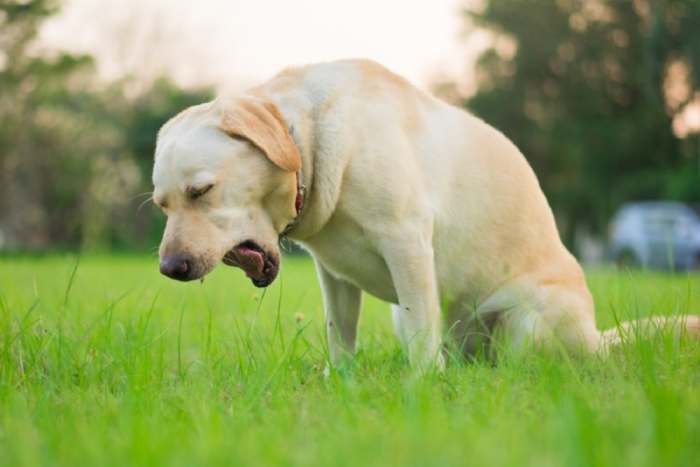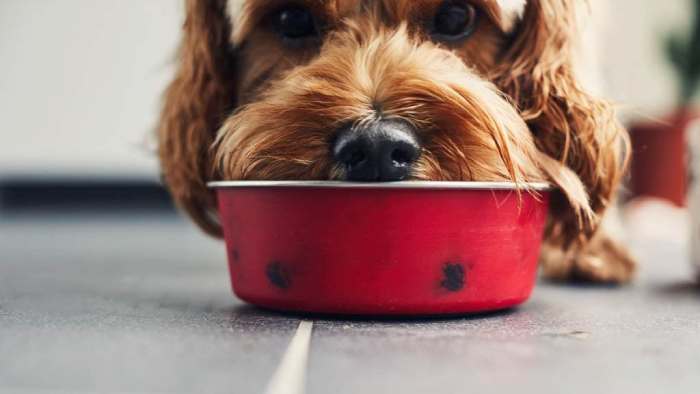Is It Bad if a Dog Eats Its Vomit? It’s like a game of tug-of-war between instinct and good health: sometimes, a dog’s instinct to eat its vomit wins out.
While this may seem unpleasant, it’s important to understand why it happens, the potential dangers, and how to prevent it, here’s an overview of what you need to know to keep your pup safe and healthy.
Reasons for Eating Vomit: Exploring this Behavior in Dogs

Recently, you may have noticed your pup eating its vomit, leaving you to wonder why. While it may be a bit of a stomach-turning sight, it’s important to remember that canines are curious creatures and are a natural response to nausea.
Eating vomit may help them recover lost nutrients or be a way to explore the taste and texture of something previously eaten. Additionally, some dogs may eat their vomit as a way to seek attention from their owners.
However, it’s important to note that it’s usually not a sign of a serious medical issue. If the vomiting persists, however, it’s best to seek veterinary attention.
Potential Dangers: Identifying Health Risks Associated with Ingesting Vomit
Although it may not be a pleasant sight, it’s important to consider the potential dangers of a dog eating its vomit. To help avoid these triggers, pet owners should be aware of the following:
- Observations:
- Look for signs of nausea, such as excessive drooling, gagging, or retching
- Monitor eating habits and look for any changes in appetite.
- Notify your vet if your dog is vomiting more than normal.
- Prevention:
- Feed your dog only healthy, nutritious food.
- Make sure your dog is getting plenty of exercise.
- Monitor your dog’s environment to ensure no hazardous materials are present.
- Recognizing signs:
- Take note if your dog is lethargic or unresponsive
- Watch for signs of dehydration, such as excessive panting or dry mouth.
- Look out for any changes in your dog’s behavior or attitude.
Treatment Options: Addressing Immediate Concerns and Seeking Veterinary Advice
If you notice any of the signs mentioned above, it’s important to seek medical attention to treat your dog and prevent further vomiting.
Treatment for dogs who’ve eaten their vomit will depend on the underlying cause. If the vomiting is due to a gastrointestinal issue, your vet may recommend dietary changes or medications to soothe your pet’s stomach and help the digestive system.
For more serious cases, they may recommend adding digestive enzymes to your pet’s diet to help break down food and absorb nutrients more easily. Surgery may sometimes be necessary to remove foreign objects or blockages.
Ultimately, it’s best to seek medical advice from your veterinarian to determine the best treatment for your pet.
Diet Considerations: Assessing if Diet Plays a Role in Vomiting Behavior

Regarding your pet’s diet, paying attention to the nutritional balance is important to help avoid vomiting episodes. To keep your dog healthy and happy, you should consider the following:
- Type of Food:
- Experiment with different types of food to find the right balance for your pet.
- Monitor how your dog responds to different foods and look for food sensitivities.
- Make dietary changes if necessary.
- Quality of Food:
- Be mindful of the quality of the food you feed your dog.
- Ensure it’s complete and balanced with the right amount of vitamins and minerals.
- Avoid foods with low-quality ingredients, added sweeteners, or artificial colors.
- Amount of Food:
- Measure the amount of food you give your dog to ensure your pet gets the nutrition it needs.
- Monitor your dog’s weight and adjust portion size accordingly.
- Ask your vet for the right amount of food for your pet.
Prevention Strategies: Implementing Measures to Minimize or Stop the Behavior
Following a few simple tips can help prevent your dog from eating its own vomit.
- Feed your pup only familiar foods, avoiding new ingredients that could upset their stomach.
- Monitor their environment for any stressors that may be causing anxiety or distress.
- Make sure to give them enough exercise and playtime, as a tired pup is less likely to engage in potentially unhealthy behaviors.
- For those dogs that are naturally more anxious, please provide them with calming chews or treats that can help reduce their stress levels.
- Lastly, make sure to keep up with their regular vet visits and checkups, as any underlying health issues may contribute to them eating their vomit.
With these tips, you can help ensure your pup stays healthy and free from this unpleasant habit.
Frequently Asked Questions:
It’s common for dogs to eat their vomit, especially if they are stressed or anxious. Their feeding habits and environmental triggers can lead to this behavior. It’s important to be understanding and provide a safe environment to help prevent this.
It’s possible that a dog’s breed could influence why they are eating their vomit. Different breeds have different dietary habits and may be prone to digestive problems, so it’s worth considering when determining why your pup is vomiting.
Imagining a sickly pup struggling to keep its food down can be heartbreaking. There are a few causes and risk factors to watch out for when it comes to a dog eating its vomit, including eating too quickly, illness, and anxiety. Knowing the signs to look for can help you provide the best care for your pup.
You can try providing alternative diets and stress relief to help prevent your dog from eating its vomit. Various meals can help reduce the likelihood of vomiting, provide regular exercise, and relieve stress.
Eating its vomit could lead to illness risks in your dog, so it’s important to adjust their diet to prevent this. Making changes such as feeding smaller, more frequent meals could help. Seek veterinary advice for the best course of action.
Conclusion:
It’s understandable to be worried if your dog eats its vomit, but it’s important to remember that it’s common for dogs to do this.
While it can cause some health concerns, there are many ways to ensure your pup is safe and healthy. With the right diet and preventive strategies, you can help ensure that your dog won’t suffer any negative consequences.
It’s best to consult your vet if your dog is exhibiting this behavior, as they can provide tailored advice to keep your pup in tip-top shape.

Hey there, I’m Janet Brooks, a dog-loving student from California. I’m all about helping pups in need, especially those without homes. Me and my awesome friends work together to give shelter and love to stray dogs. Oh, and I also write blogs about dogs to share helpful info.